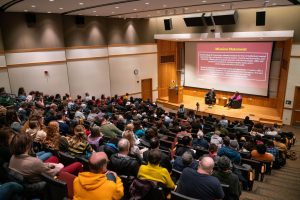On the Record with Andy Statman, Mandolinist and Clarinetist

Courtesty of clarinet_klezmer.com
Andy Statman, klezmer clarinetist and bluegrass mandolinist, who gave a master class and per- formed at the Cat in the Cream on Monday.
March 13, 2015
Andy Statman, a highly praised mandolinist and clarinetist who hails from New York City, works with a variety of musical genres, including American folk, klezmer and jazz. He has released over two dozen studio albums and received recognition for his work in the field, including a National Heritage Fellowship. On Monday, Statman gave a master class for students and performed at the Cat in the Cream. The Review spoke with Statman by telephone after his return to his home in Brooklyn.
Can you tell us a little bit about your visit here? What did you do and whom did you work with?
I was working with … Jim Whitney on bass and Larry Eagle on drums and percussion, and one of the professors, Jamey Haddad, joined us, playing both at the master class and at the concert.
Do you give master classes at a lot of schools? If so, what do you think you might give and get out of it?
I do, and you know … at universities, mainly most of the students are not that familiar with the music that I’m teaching, so it gives them a hands-on understanding of particular styles that I might teach. … If you really master an understanding of one style, then you can go to another style and you’ll know what to look for or understand how to relate to it in a much deeper way. … Students always have questions or you always have to find new ways of teaching things, so as a musician and as a person, you grow out of that.
Does the genre-blending in your music come naturally, or does it take more careful planning?
The careful planning is learning the genre. So, I studied one genre very deeply, then I was able to go to another. Like I was saying before, once you know what makes one genre tick … [then] you’re dealing with elements such as phrasing, improvisation, ornamentation, how to play different types of melody, how to express emotions through music. All varying styles have pretty much the same elements that have to be dealt with. Certain types of music you want to have a certain tone production on certain instruments. Certain music requires certain instruments that others don’t. So once you begin to have an understanding of all the elements that make up a style, you’ll understand those elements in another style. [You] find your own place in the music, which means you have to find your own way of speaking that stylistic language. … What usually happens is the up-and-coming musicians master the style that excites them. … Once they’re able to master them, it’s like learning a language. … We’re both speaking English, but we’ll speak it differently … and that’s really when you’ve internalized a language of expressing what you want to say.
What do you see in your future?
As a general response, I just see [my] music as continuing to develop. Musicians generally engaged in their craft get better as they get older, so their skills are more refined and more honed. They have a way of looking at things more deeply and more effectively, so that’s what I foresee happening, or what I hope will happen.
What’s the best piece of advice you could give to a young musician?
It would be several-fold. I think the first thing to do is to [recognize] that most of us are playing music because we like the way it makes us feel. There’s an experience from playing music that is very positive. It’s important to stay in touch with that, particularly when you start dealing with technical issues. You can get lost in the world of athletics with technique and lose that connection with the joy of playing music or just [get lost while] dealing with the music business. You know, people [are] just trying to make a living playing music, which is hard, especially if you want to play creative music. You need to sort of stick by your guns and stay with that feeling as much as you can. In a nutshell, it’s just trying to stay in touch with why you’re playing music. … You need to keep in touch with that because there are lots of things that can take you away from that. Then you need to practice. You really need to learn to master a style. You need to learn what makes a style tick. … You need to understand what you’re playing … and how to most effectively play it. That will enhance your ability to effectively play the music for other people and hopefully produce a similar experience in them that you’re hoping to have yourself.

























